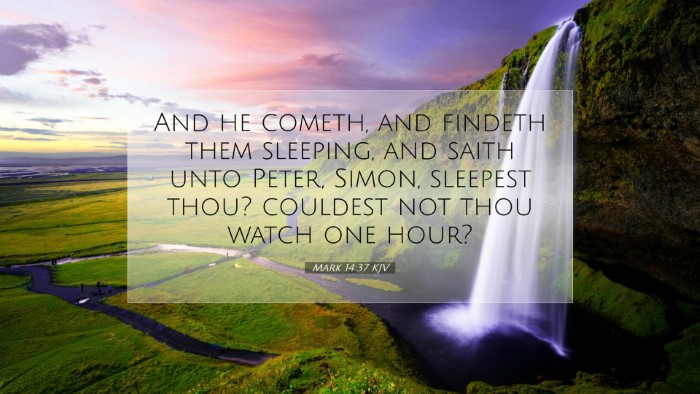Commentary on Mark 14:37
Bible Verse: Mark 14:37 - "And he cometh, and findeth them asleep, and saith unto Peter, Simon, sleepest thou? couldest not thou watch one hour?"
Introduction
The context of Mark 14:37 is pivotal, occurring in the Garden of Gethsemane shortly before the arrest of Jesus. This moment captures both the deep anguish of Christ and the disciples' human frailty. Various public domain commentaries provide a rich understanding of the implications and teachings found within this verse.
Exegesis and Interpretation
This verse serves as a poignant reminder of the spiritual vigilance that Jesus expected from His disciples. The fact that 'he cometh, and findeth them asleep,' indicates not only physical weariness but also a spiritual lethargy that runs contrary to the gravity of the moment.
Matthew Henry's Commentary
Matthew Henry emphasizes the disciples’ failure to remain vigilant during a critical time. He notes the significance of Jesus addressing Peter specifically, referring to him not as 'Peter,' but as 'Simon,' which suggests a moment of rebuke and highlights Peter's vulnerability. Henry suggests this speaks volumes about the state of Peter’s heart, considering his earlier bold declarations of faithfulness.
Albert Barnes' Insights
According to Albert Barnes, this passage serves to demonstrate the weakness of human nature. Barnes writes that despite the disciples' prior promises of loyalty, their fleshly weakness was evident. He notes Jesus’ disappointment at their lack of readiness and willingness to support Him in prayer during His hour of need. This emphasizes the stark contrast between the spirit's willingness and the flesh's inability.
Adam Clarke's Analysis
Adam Clarke provides a unique perspective by discussing the significance of the 'one hour' that Jesus mentions. He interprets this as a test of commitment and watchfulness. Clarke notes that while Christ prayed for His disciples, they were found sleeping, symbolizing broader themes of spiritual preparedness versus spiritual slumber. Clarke posits that this incident reveals the disciples’ inability to comprehend the severity of their situation, which foreshadows their forthcoming desertion of Jesus.
Theological Implications
Theologically, Mark 14:37 carries deep implications regarding the nature of prayer, the expectation of vigilance in the Christian life, and the recognition of human weakness. The call to watchfulness is a recurring theme in Scripture, inviting believers to remain alert spiritually.
- Spiritual Vigilance: The disciples’ failure to stay awake during Jesus’ agony points to a greater principle about spiritual readiness.
- Human Weakness: This event does not merely illustrate the disciples' physical tiredness but serves as a representation of the broader human condition — the struggle against sin and temptation.
- Christ's Expectation: Jesus’ specific addressing of Peter reminds leaders (like pastors) of their responsibility to pray for and encourage those they lead to stay vigilant in faith.
Practical Applications
For pastors, students, and theologians, several practical applications emerge from this verse:
- Prayer Life: This passage can provoke important questions regarding one’s prayer life. Are we dedicating time to connect with God, especially during tumultuous times?
- Awareness of Temptation: Recognizing our propensity for spiritual slumber can lead to proactive measures in our spiritual disciplines.
- Your Accountability: The verse challenges us to hold ourselves and others accountable in our spiritual responsibilities toward one another.
Conclusion
Mark 14:37 is more than just a historical account; it encapsulates profound spiritual truths about vigilance, human inadequacy, and the call to prayer. By reflecting on the insights from Matthew Henry, Albert Barnes, and Adam Clarke, we are reminded of our need to remain awake in our spiritual lives, particularly in times of trial. The heart of the lesson lies in recognizing our dependence on Christ and the necessity of support through prayer, highlighting the interconnectedness of faith and community.


